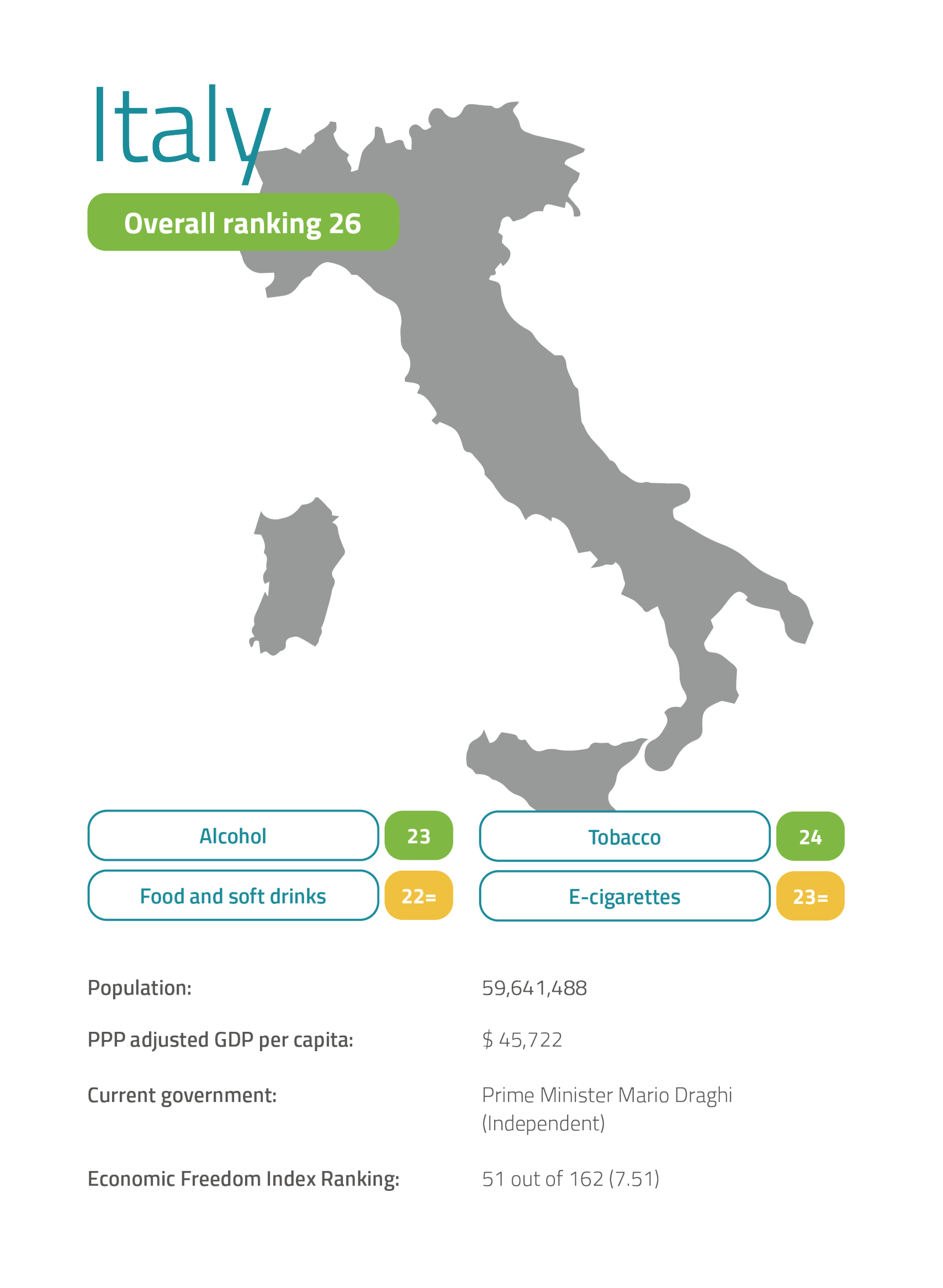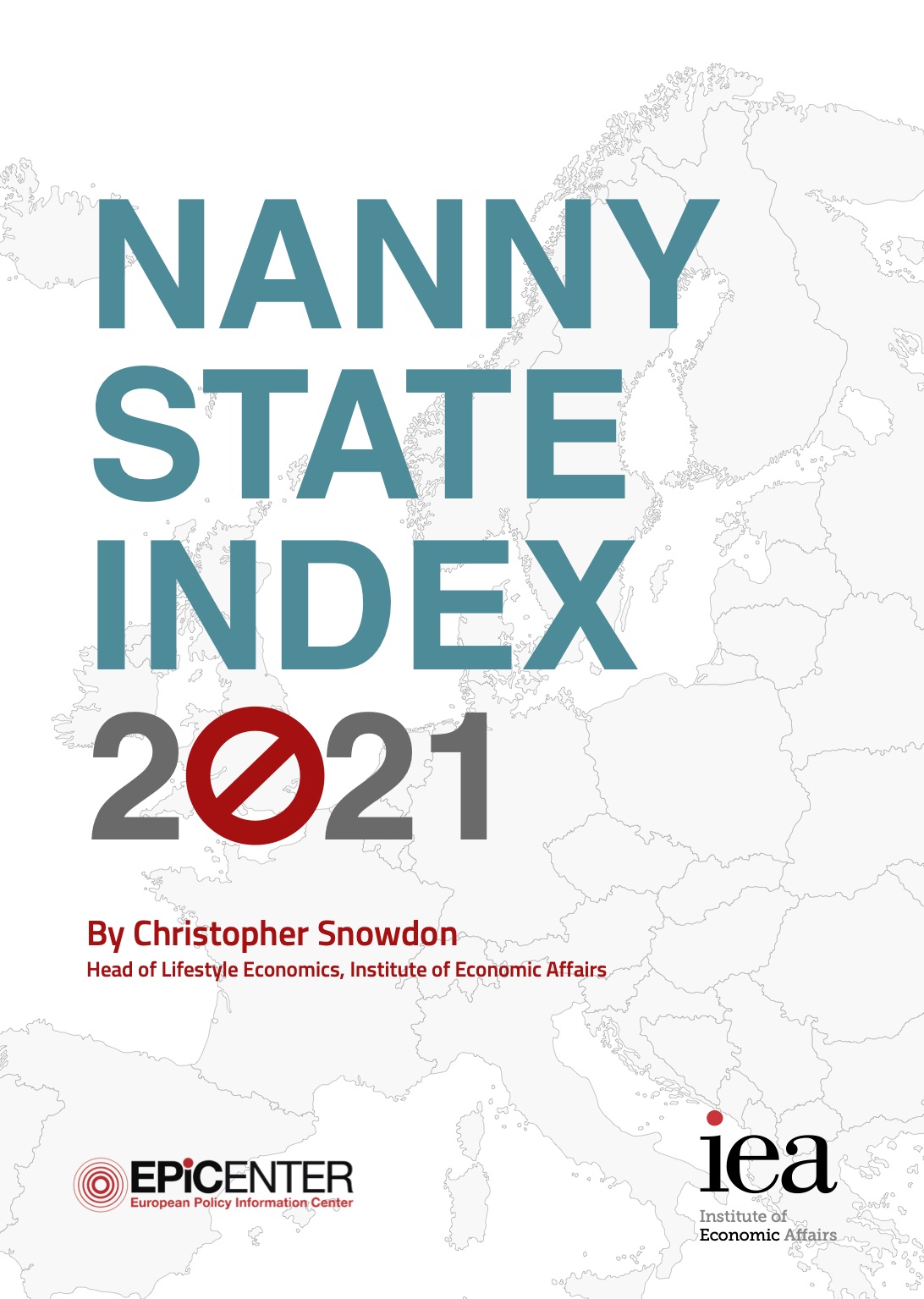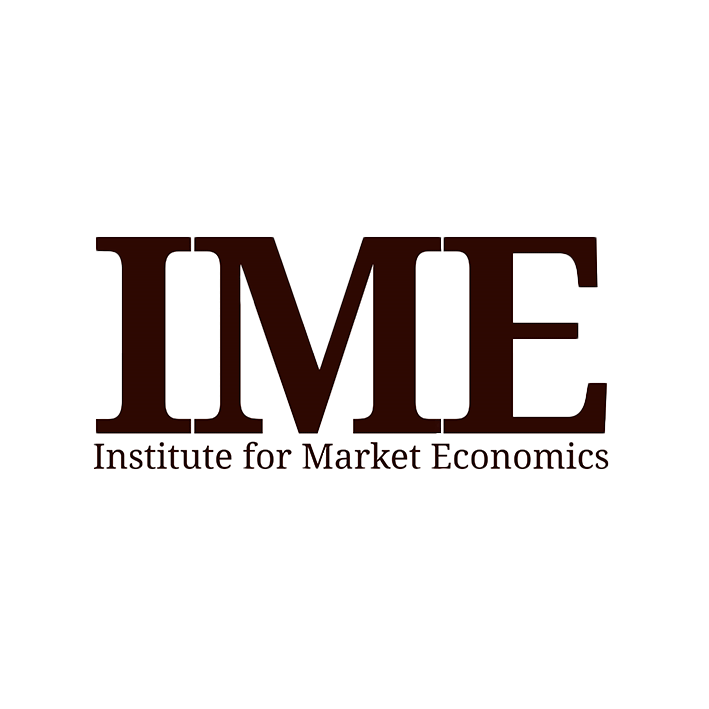
Italy has swung back and forth on sin taxes in recent years. In 2014, it became the first EU country to tax e-cigarette fluid when Italian MPs complained about losing tobacco revenue. Initially set at a punitive rate of €0.38 per ml (€3.80 per standard bottle), the tax was subsequently raised to €0.3976 and linked to the Weighted Average Price (WAP) of cigarettes. This was the highest rate in the EU and was a significant constraint on Italy’s vaping scene. Fortunately, the government agreed to slash it to €0.13 per ml in January 2019, with a lower rate of €0.08 per ml for fluids that do not contain nicotine.
The government has since decided to make vaping less affordable again. It raised the tax by 15 per cent in 2021 and further rises are planned for 2022 and 2023 (rises of 20 per cent and 25 per cent compared to the 2020 rate respectively). Tax on vape juice that does not contain nicotine will also rise incrementally by 20 per cent by 2023. There will also be large rises in the tax on heated tobacco products. Taxed at a rate of €1.27 per pack (€63.32 per 1,000 heat sticks) in 2020, there was a 30 per cent tax hike in 2021 and two further rises are planned for 2022 and 2023 which will take the tax rate 40 per cent above 2020 levels.
A sugar tax was planned for 2020 but was postponed until January 2021 due to COVID-19. In December 2020, it was pushed back again. It is now not expected to be introduced until 2022 at the earliest, at a rate of €0.10 per litre.
Italy has had a near-total ban on smoking in public places since 2005. In 2016, the ban was extended to private vehicles if a passenger is pregnant or younger than 18. Smoking is also banned in some parks. In January 2021, local authorities in Milan banned smoking at bus stops and some other outdoor areas. Smoking has also been banned on Venice’s Bibione beach.
Cross-border sales of e-cigarette fluid are banned but a ban on domestic internet sales was repealed in January 2019. It has always been legal to use e-cigarettes indoors with few restrictions and the government never gold-plated the Tobacco Products Directive’s advertising laws.
There is little in the way of food control policy in Italy although food and drinks that are ‘high in sugar, fat and caffeine’ were banned from school vending machines in 2014.
Alcohol advertising is largely unrestricted. Taxes on beer and spirits are relatively low and, as in most EU countries, there is no duty on wine.
With thanks to Istituto Bruno Leoni
About
The Nanny State Index (NSI) is a league table of the worst places in Europe to eat, drink, smoke and vape. The initiative was launched in March 2016 and was a media hit right across Europe. It is masterminded and led by IEA’s Christopher Snowdon with partners from all over Europe.
Enquiries: info@epicenternetwork.eu
Download Publication

Previous version: 2019
Categories
About the Editor
Christopher Snowdon is the head of Lifestyle Economics at the Institute of Economic Affairs. His research focuses on lifestyle freedoms, prohibition and policy-based evidence. He is a regular contributor to the Spectator, Telegraph and Spiked and often appears on TV and radio discussing social and economic issues.
Snowdon’s work encompasses a diverse range of topics including ‘sin taxes’, state funding of charities, happiness economics, ‘public health’ regulation, gambling and the black market. Recent publications include ‘Drinking, Fast and Slow’, ‘The Proof of the Pudding: Denmark’s Fat Tax Fiasco’, ‘A Safer Bet’, and ‘You Had One Job’. He is also the author of ‘Killjoys’ (2017), ‘Selfishness, Greed and Capitalism’ (2015), ‘The Art of Suppression’ (2011), ‘The Spirit Level Delusion’ (2010), ‘Velvet Glove, Iron Fist’ (2009).
Italy 2021

Italy has swung back and forth on sin taxes in recent years. In 2014, it became the first EU country to tax e-cigarette fluid when Italian MPs complained about losing tobacco revenue. Initially set at a punitive rate of €0.38 per ml (€3.80 per standard bottle), the tax was subsequently raised to €0.3976 and linked to the Weighted Average Price (WAP) of cigarettes. This was the highest rate in the EU and was a significant constraint on Italy’s vaping scene. Fortunately, the government agreed to slash it to €0.13 per ml in January 2019, with a lower rate of €0.08 per ml for fluids that do not contain nicotine.
The government has since decided to make vaping less affordable again. It raised the tax by 15 per cent in 2021 and further rises are planned for 2022 and 2023 (rises of 20 per cent and 25 per cent compared to the 2020 rate respectively). Tax on vape juice that does not contain nicotine will also rise incrementally by 20 per cent by 2023. There will also be large rises in the tax on heated tobacco products. Taxed at a rate of €1.27 per pack (€63.32 per 1,000 heat sticks) in 2020, there was a 30 per cent tax hike in 2021 and two further rises are planned for 2022 and 2023 which will take the tax rate 40 per cent above 2020 levels.
A sugar tax was planned for 2020 but was postponed until January 2021 due to COVID-19. In December 2020, it was pushed back again. It is now not expected to be introduced until 2022 at the earliest, at a rate of €0.10 per litre.
Italy has had a near-total ban on smoking in public places since 2005. In 2016, the ban was extended to private vehicles if a passenger is pregnant or younger than 18. Smoking is also banned in some parks. In January 2021, local authorities in Milan banned smoking at bus stops and some other outdoor areas. Smoking has also been banned on Venice’s Bibione beach.
Cross-border sales of e-cigarette fluid are banned but a ban on domestic internet sales was repealed in January 2019. It has always been legal to use e-cigarettes indoors with few restrictions and the government never gold-plated the Tobacco Products Directive’s advertising laws.
There is little in the way of food control policy in Italy although food and drinks that are ‘high in sugar, fat and caffeine’ were banned from school vending machines in 2014.
Alcohol advertising is largely unrestricted. Taxes on beer and spirits are relatively low and, as in most EU countries, there is no duty on wine.
With thanks to Istituto Bruno Leoni

 Austria
Austria Belgium
Belgium Bulgaria
Bulgaria Croatia
Croatia Cyprus
Cyprus Czech Republic
Czech Republic Denmark
Denmark Estonia
Estonia Finland
Finland France
France Germany
Germany Greece
Greece Hungary
Hungary Ireland
Ireland Italy
Italy Latvia
Latvia Lithuania
Lithuania Luxembourg
Luxembourg Malta
Malta Netherlands
Netherlands Norway
Norway Poland
Poland Portugal
Portugal Romania
Romania Slovakia
Slovakia Slovenia
Slovenia Spain
Spain Sweden
Sweden Turkey
Turkey United Kingdom
United Kingdom


















